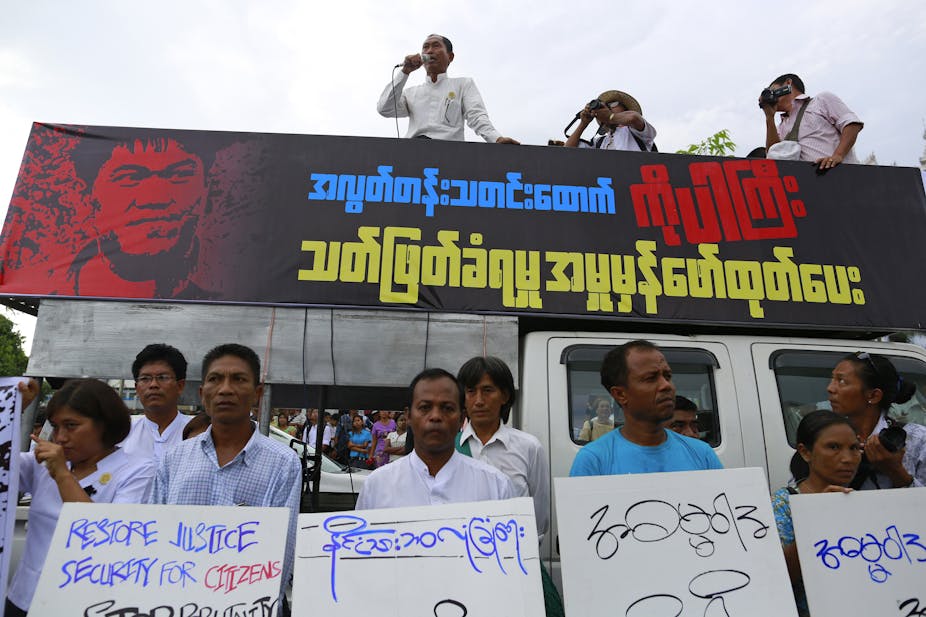Burma (aka Myanmar) has just marked the 27th anniversary of the so-called “8888 uprising” of 1988, when tens of thousands of protesters took to the streets in protest against the brutal military dictatorship which then ruled the country. Pro-democracy demonstrations were ruthlessly suppressed, thousands of protesters and their leaders were imprisoned, and Aung San Suu Kyi became one of the world’s most famous political prisoners.
So began Burma’s darkest period, which lasted until the military government embarked on a reform process in 2007. That process has raised hopes around the world that Burma could soon emerge from its long period of brutal authoritarian rule.
Significant reforms have since been enacted, and with parliamentary elections scheduled for November 8 2015, the country is now heading towards arguably the most important test of its reform process.
It’s long been clear that Burma’s unresolved ethnic and religious conflicts will be long-term challenges for whoever takes power after November 8, but other more immediate challenges have arisen in recent weeks – and there are signs that Burma’s so-called “road-map to democracy” is falling apart.
Watch your back
On August 12, Shwe Mann, the leader of the ruling Union Solidarity and Development Party (USDP), was removed from power in an internal coup. Security forces surrounded the USDP’s party headquarters, and several hours later it was announced that Shwe Mann had been replaced by Htay Oo, a much closer ally of current president Thein Sein.

A party made up largely of ex-military officers, the USDP was created by the former junta, which has used it as a parliamentary tool to control the reform process.
Shwe Mann had challenged that control by making overtures to Aung San Suu Kyi and her National League for Democracy (NLD) party, clearly in hopes of establishing formal alliances between the two parties after November 8. He had also tried to dilute the old junta’s power in the USDP’s recent selection of its parliamentary candidates: out of 159 senior and recently retired military officers who put their names forward, only 59 were selected.
Clearly, he has been made to pay for that.
Infighting
Meanwhile, even as the internal politics of the USDP have taken an alarming turn, the opposition also appears to be turning against itself.
Controversy surrounds the outcome of the NLD’s recent selection of its parliamentary candidates in which a number of highly significant and very popular figures were not chosen by the party.

Aung San Suu Kyi and the NLD certainly do not enjoy universal support within the opposition movement, which is by no means homogenous. While they have not attracted as much recognition outside of Burma, other, highly influential opposition figures and movements exist. One of the most prominent is the 88 Generation, which comprises many ex-political prisoners who, as students in 1988, effectively kick-started the 8888 uprising. Having been released from prison as part of the reform process, several members of the 88 Generation have risen to national prominence.
One of the most high-profile of 88 Generation members is Ko Ko Gyi, imprisoned for 17 years for his part in the 8888 uprising. In a move which was widely seen as an attempt to unite the opposition, Ko Ko Gyi and 17 other prominent 88 Generation members put their names forward as prospective parliamentary candidates for the NLD.
The NLD announced it had not selected Ko Ko Gyi as a candidate, and also rejected all but one of the candidates from the 88 Generation. According to NLD party spokesperson, that was based on a decision to exclude “unqualified” candidates – even though few inside Burma would describe Ko Ko Gyi and his generation as unqualified.
A few days later, Ko Ko Gyi announced his intention to form a new political party – fuelling worries that the opposition is now a house divided against itself.
Condemned
To top things off, the UN Special Rapporteur for Burma, Yanghee Lee, recently concluded her third visit to the country. For the international community, the UN Special Rapporteur’s reports offer an authoritative assessment of the reform process.
Since her appointment last year, she has consistently acknowledged Burma’s many strides, but she’s also drawn attention to many persistent matters of deep concern, including the plight of the Rohingya Muslim minority and the appalling conditions they face.
After her last visit in January 2015, Lee was harshly criticised by the Burmese government for her alleged bias, and in particular for her findings on the Rohingya situation. The Buddhist Nationalist monk Wirathu famously referred to her as a “bitch” and a “whore”. Her most recent visit has attracted further vilification with the Burmese Foreign Ministry calling for the abolition of all country specific UN mandates.
A return to the terrible days of the 8888 uprising seems unlikely, but Burma’s journey towards a democratic future seems more uncertain than ever.

